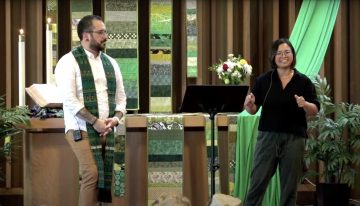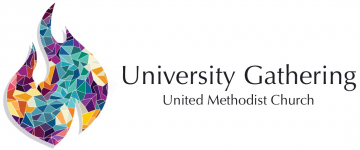News
Good Tension
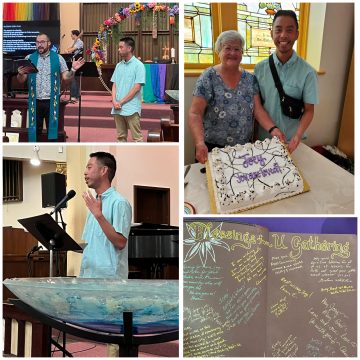
Kindred in Christ,
This past week was a bittersweet Sunday, as we celebrated Joey Chin’s time with us and sent him forth to Wesley Seminary in Washington D.C.! Thanks to all those that contributed to the celebration with their time, talent, and cooking skills! It was a meaningful time of worship and fellowship. I personally felt proud of Joey as he preached his first sermon, and I also felt proud of all of us for being a community that brings new people in, nurtures them, and then sends them out into the world to make a difference!
We are currently in a series titled, Thresholds: Moving Through Life’s Transitions. Together we have reflected on the many thresholds in our lives as individuals and in our congregational life as a collective, and the unique ways God shows up on those liminal spaces. Joey continued this theme by reflecting on the threshold he now finds himself in, leaving Seattle and starting at Wesley Seminary. He helped us further reflect on our own journey as a community. And I really appreciated the following quote he mentioned during his sermon:
“What if the promised land isn’t actually the destination? What if it’s not pearly gates or permanent occupation or safety or a place where everyone knows your name? What if home was always going to be the walking and who you were walking with. …This is what Jesus invites us into, this is the peace that God offers, not the lack of tension but a recognition of the tension. There is no sound that comes from the guitar unless there is tension on the strings.” – Dr. Brian Bantum
May we continue to journey forward with one another, embracing the tension and changes along the way. And may we recognize that we are already home whenever we are on the move together in God.
Alongside you,
Rev. Paul Ortiz
Tie-Dye Event a Success
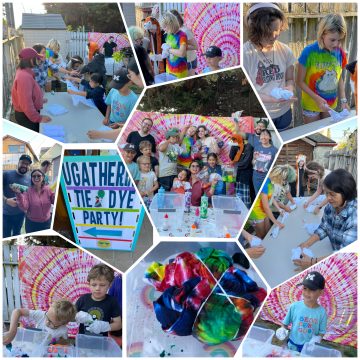
Hello UGatherers- Jemina here,
As we slowly wind down from our peak summer days I can’t help but get excited for cozy sweater season and moments to reconnect and hear about everyone’s summer adventures. Although this season isn’t exactly as I imagined, it has also been a blessing in disguise. I have found moments to connect with my family through deep grief and high hopes. Most recently at UGathering we hosted our first tie-dye party and it was a fantastic experience! I’ve always loved getting my hands dirty, and tie-dye is the perfect fun mess for that. It was truly wonderful to spend time with our children and youth during these busy summer days. The joy of seeing everyone create their own funky shirts and wacky socks, and the vibrant, speckled hands, made the day special.
A big thank you goes to our dedicated volunteers from our congregation, Green Lake and Wallingford UMC! ~ especially to Pastor Willie and his yard—couldn’t have done it without ya’ll. I hope to keep uplifting the joy of our youth, and moments like these remind me of why it’s so important. The art, the pizza, the music, and the games all came together to create lasting memories.
Thresholds: Moving Through Life’s Transitions
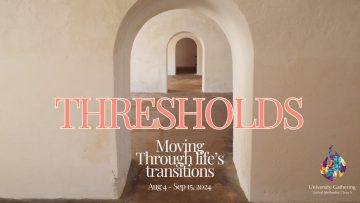
Kindred in Christ,
When my child was three years old, they were really into saying catch phrases. They would say them to me, and to others on the street. But they often said them wrong! For Example, when someone would do something nice for them, like give them candy, they would lean in and say, “your welcome!”. And I would tell them, “First you say, ‘thank you,’ and the other person is supposed to says, ‘you’re welcome’! But they would get a mischievous look on their face, laugh, and continue to say it their way anyhow. They’ve always liked to break the rules.
They apparently had also heard of the expressions, “How do you like them apples?” and “Try this on for size.” But instead of saying either of those, they would tell people, “Try them apples on for size!”.
Again, I would tell them, “That doesn’t make any sense. It is either one or the other. It can’t be both at the same time.” And again, they would laugh and continue to say it their way anyhow.
I imagine that the crowds felt a similar frustration when hearing Jesus proclaim that he was both the Good Shepherd and the Gateway (John 10:1-11). How can Jesus be both our guide, and the threshold we passthrough into something new at the same time? It doesn’t make sense. It must be one or the other, the crowds must have thought to themselves.
Yet, I imagine Jesus chuckling at the crowd’s initial confusion, and continuing to invite them, and us today, to experience God as both-and, and see how that might transform our spiritual lives. Jesus invites us to “try them apples on for size” and see what happens.
We are beginning a series this week titled Thresholds: Moving Though Life’s Transitions. We will explore how God is not only with us though life’s many changes, but how God’s healing and activity in our lives often shows up as some kind of movement from one stage to the next.
I look forward to exploring this further with you in-person, and online, as we continue to move through our own thresholds as a community, and encounter God and one another in fresh new ways.
Alongside you,
Rev. Paul Ortiz
Merger Exploration
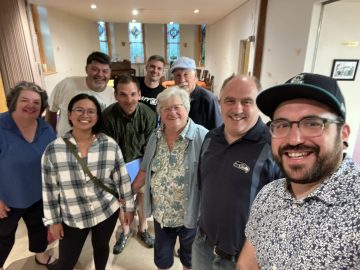
Kindred in Christ,
This past week, the Merger Exploration Team met for the first time (see above). As you may know, this is a team composed of a committee from Green Lake UMC and a committee from U Gathering UMC, which will explore a possible shared missional future for both communities, and will lead us in that discernment and all-community discussions (see below for more info). While we recognize that we are unsure if an official merger will work out, we are excited to open ourselves up to where the Spirit may lead. Pictured above from GLUMC: Sue Wolf, Pastor Willie Deuel, Dave Goddard, and Ross Wolf, and from UGUMC: Jemina Marasigan, Graham Whitehouse, Sharon Fisher, Larry Erickson, and Pastor Paul Ortiz. Not pictured, but also in attendance was Erica Mattingly (UGUMC), Clara Pang (GLUMC), and Heather Teegarden (GLUMC).
Oftentimes as individuals and as a church we are tempted to wait and not act until we have every possible outcome figured out in our heads. This might grant us a sense of security. And while it is good to make informed decisions, there is also the danger of becoming stagnant because we are waiting for the perfect moment to act, which may never come. Indeed, this is the story of many declining congregations that refuse to change or try something new. I am proud that we are a community that continues to step out in faith, and discern together where God may be leading next. At our meeting we shared the dreams of the past and how that might fit into our evolving future as we build further relationships and seek to continue our mission to our surrounding neighborhoods. And that stepping out into the unknown, and being open to seeking God’s guidance in community, is what faith feels like in our lives.
Our Wesleyan/Methodist tradition has always insisted that faith and works go hand in hand. But often we think of those as two separate partners in tandem. But, as we will explore this Sunday, faith is the letting go of our need for certainty in our lives, our need to have it all figured out, which then frees us to step out and work for the common good in fresh ways that we might not have otherwise. I look forward to exploring this way of being with you in person or online as we conclude our series, Means of Grace.
Alongside you,
Rev. Paul Ortiz
Visit to Des Moines UMC
